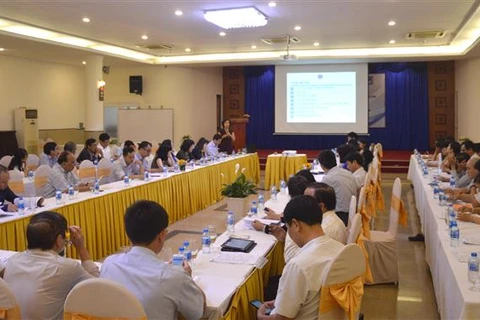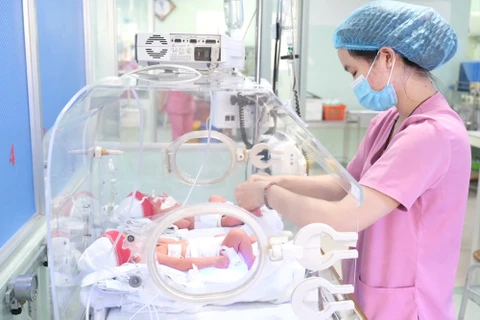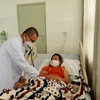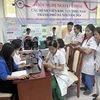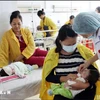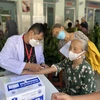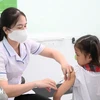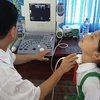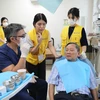 A village-based midwife helps a mother take care of her baby in Tu Mo Rong district in the Central Highlands province of Kon Tum. (Photo: VNA)
A village-based midwife helps a mother take care of her baby in Tu Mo Rong district in the Central Highlands province of Kon Tum. (Photo: VNA) Many also still give birth at home.
Dinh Anh Tuan from the Maternal and Child Health Department under the Ministry of Health said that it is necessary to train more village-based midwives because the country now has only 3,000.
The need for village-based midwives is very high, he said.
Therefore, the ministry plans to train more village-based midwives and continue strengthening the quality of staff in the future, he said.
It will also update the knowledge and skills as well as provide necessary tools for helping women when they are giving birth, following Decision No. 3755 /QD-BYT issued on June 21, 2018 by the ministry.
Tuan said the department has coordinated with relevant units and localities to build a comprehensive training programme from basic to in-depth knowledge for midwives.
The training includes antenatal, childbirth and post-partum care, as well as information on nutrition, family planning and breastfeeding, he said.
It is a comprehensive programme that gives the village-based midwives full knowledge and skills, he said.
The midwives will be trained through four stages of theory, pre-clinical practice on the model, then practice at medical facilities and finally internships at a medical facility, he said.
During the six months of training, a midwife will learn theory in the morning and practise in the afternoon. They will be on duty in the evening, he said.
“It means that they will work as medical staff,” he said.
The training process is strict and scientific, so the quality of village-based midwives has improved, he said.
All of them meet the requirements, he said.
"The team of village-based midwives has never suffered an unfortunate accident with mothers and children over the past three decades," he said.
Flexible training
Luong Van Kien, deputy director of the Health Department in the northern mountainous province of Dien Bien, said the province is one of the localities that maintains a very good team of village-based midwives.
However, it is not easy to recruit people to participate in the training programme, he said.
Therefore, the department must flexibly apply the standards that the health ministry has developed to select people to participate in the training programme, he said.
During the training, it often has to be flexible in many situations. For example, it had to give priority to married women to participate in the training programme because if unmarried women are selected, the women might leave the locality after they get married, he said.
Regarding the cultural level, instead of selecting women who have graduated from high school, it only required that they be fluent in reading and writing, he said.
Many women brought their babies and even their husbands when they participated in the training programme. So the organisers have to be flexible to arrange accommodation for their babies and husbands, he added.
He added that it also gives priority to those who have lived in the locality for a long time and have a close relationship with local people in the village.
Important role
Doctor Nguyen Huy Du of UNICEF Vietnam told Suck hoe & Doi song (Health & Life) online newspaper that he highly appreciated the role of village-based midwives.
"The midwives play an extremely important role, especially in remote and disadvantaged areas," he said.
They are the bridge of the health sector, bringing safe maternal and childcare services to ethnic-minority women, he said.
The midwives also bring mothers to medical facilities, helping them to receive antenatal care and delivery at medical facilities, he said.
The village-based midwives contribute to ensuring the goal of safe motherhood of ethnic-minority women, he said.
"It is necessary to ensure that all people have equal access to health services. Pregnant mothers need to have access to antenatal care, delivery, and health care services so that no one is left behind,” he said.
In the meantime, Kiên said the ethnic-minority women used to be afraid of going to medical facilities for prenatal check-ups.
Since the operation of the village-based midwife team, the number of ethnic-minority women going to medical facilities for prenatal check-ups has increased, he said./.
VNA

